Who is the blogger?
Archived entry
It Happened One Night (1934)
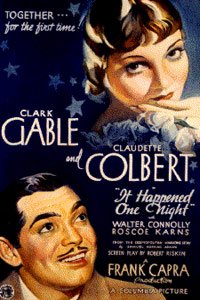 Claudette Colbert and Clark Gable define “Capraesque” in this madcap Depression era comedy that marries glamour and glitz to populist sentiment. Tag along for a wild ride with this TVO Saturday Night at the Movies special on Frank Capra’s classic Hollywood film .
Claudette Colbert and Clark Gable define “Capraesque” in this madcap Depression era comedy that marries glamour and glitz to populist sentiment. Tag along for a wild ride with this TVO Saturday Night at the Movies special on Frank Capra’s classic Hollywood film .
See the video preview from TVO
The Good Old Bad Old Days
I sometimes wonder if my grandmother would have gone to see a film like “It Happened One Night” at the movie theatre. I look at black and white photos with the funny old hats and the rattletrap black Model Ts and chuckle.
When I was a child at my grandmother’s house, I remember being fascinated by a pretty little music box that played a sweet and sentimental tune from a bygone era. The tune was called “Always”. That sweet little melody from the music box somehow captured for my childish mind something that I witnessed in my grandparents’ marriage. It was a marriage which lasted for over half a century. What I witnessed was something good, something true and something real.
I also remember the odd little wood frame cottages that my grandparents used to rent to “vacationers” up from the big city who came to enjoy a period of respite by the lake. The cabins were exactly the modest kind of affairs that were seen in the “It Happened One Night”; the kind that Claudette Colbert and Clark Gable stayed in at the roadside “auto camps” pictured in this 1930’s film. They were so small and so much less complicated than what people get these days when they “rent a cottage” while on vacation. And the cost? Single digit dollars for a night’s stay? Well, there’s no comparison!
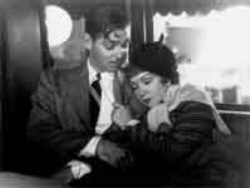 Things were so much different in those days. Goodness gracious me! The smoking for example - How attitudes have changed! Once upon a time it was considered the height of chic to have a cigarette dangling from your fingertips in movieland. And all the fuss about a young unmarried woman gallivanting around the countryside without a chaperone! It was unthinkable for a decent young lady at the time to exercise such independence. We were treated to sexist attitudes galour what with all the fanny slapping and skirt hiking going on. It was not just the the terribly annoying bus seatmate, Oscar Shapely, whom I found to be particularly loathsome for his extremely sexist behaviour.
Things were so much different in those days. Goodness gracious me! The smoking for example - How attitudes have changed! Once upon a time it was considered the height of chic to have a cigarette dangling from your fingertips in movieland. And all the fuss about a young unmarried woman gallivanting around the countryside without a chaperone! It was unthinkable for a decent young lady at the time to exercise such independence. We were treated to sexist attitudes galour what with all the fanny slapping and skirt hiking going on. It was not just the the terribly annoying bus seatmate, Oscar Shapely, whom I found to be particularly loathsome for his extremely sexist behaviour.
Perhaps some things are best left behind in the dust of history as “bad ideas that didn’t quite work” – kind of like that misshapen autogyro plane contraption that the celebrity aviator, King Westley, descends in for his highly publicized society wedding. Thank goodness that much of today’s society has moved on from such awkward and ill-conceived encumbrances.
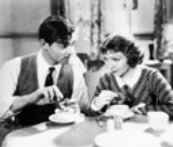 The misadventures of the fabulously wealthy heiress, Ellie Andrews, are apparently of national interest. Ellie runs away from a controlling father and into the arms of her shallow and self-preoccupied fiancé, King Westley. During her mad flight to freedom Ellie encounters for the first time life as it is commonly lived. Waiting in line to go to the bathroom, not having enough money to buy lunch, and losing all her worldly possessions in her luggage are all novel experiences for Miss Ellie.
The misadventures of the fabulously wealthy heiress, Ellie Andrews, are apparently of national interest. Ellie runs away from a controlling father and into the arms of her shallow and self-preoccupied fiancé, King Westley. During her mad flight to freedom Ellie encounters for the first time life as it is commonly lived. Waiting in line to go to the bathroom, not having enough money to buy lunch, and losing all her worldly possessions in her luggage are all novel experiences for Miss Ellie.
They were certainly common enough experiences for most folk in Frank Capra’s 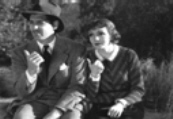 Depression era audience. Perhaps the juxtaposition of the everyday experiences of the ingénue, Miss Anderson, with the glitz and glamour of her former life account for the film’s runaway success at the box office and at the Oscars. While the film’s popularity might be a little hard to account for by today’s standards, it certainly had something to offer to the audience of its day.
Depression era audience. Perhaps the juxtaposition of the everyday experiences of the ingénue, Miss Anderson, with the glitz and glamour of her former life account for the film’s runaway success at the box office and at the Oscars. While the film’s popularity might be a little hard to account for by today’s standards, it certainly had something to offer to the audience of its day.
Ellie’s unpreparedness for life outside of the shelter of the family fortune is equalled only by her lack of preparation for a relationship with someone like Peter Warne.
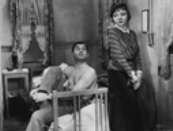 Enter Clark Gable playing “the real man”. Tossing the lack of an undershirt during the disrobing scenes aside for the moment, what seems to define Peter Warne as a “real man” is his lack of regard for the pretensions of the well-heeled socialite. Miss Ellie’s shiny high heels do indeed get her in trouble. They cause her considerable discomfort after a long walk over farmers’ fields and dirt roads. After enough failed expectations and consequent discomfort, Ellie begins to rethink some of her basic approaches to life.
Enter Clark Gable playing “the real man”. Tossing the lack of an undershirt during the disrobing scenes aside for the moment, what seems to define Peter Warne as a “real man” is his lack of regard for the pretensions of the well-heeled socialite. Miss Ellie’s shiny high heels do indeed get her in trouble. They cause her considerable discomfort after a long walk over farmers’ fields and dirt roads. After enough failed expectations and consequent discomfort, Ellie begins to rethink some of her basic approaches to life.
It may be apparent to most why Ellie would want to reconsider her impending matrimonial state to the vain and obsequious King Westley. While Peter Warne might be a handsome and footloose enough fellow to be considered as a replacement, it remains a mystery as to why Ellie would want to marry anyone at all in the first place. It just seems to be a given that Ellie has to marry somebody by the end of the film. After all, we have to have an excuse to display the gorgeous satin wedding gown and Claudette Colbert’s exquisite figure in the said gown.
Ellie’s first impulse is to marry out of spite. Her next decision seems to be to marry out of resignation and despair. Will she finally get it right the third time around and marry “for love”? We all are certainly left hoping so.
 But there’s something missing here. People don’t go around getting married just in order to escape their present dilemmas, to have sex and to oblige social expectations. Well, I mean, they do, but - well, you would hope there would be something more to it than that. And I don’t mean that sappy doe-eyed look and the equally silly song about “Young people in love are never hungry . . .”! That’s all part of the Hollywood romance legend. It’s very appealing for selling movie theatre tickets.
But there’s something missing here. People don’t go around getting married just in order to escape their present dilemmas, to have sex and to oblige social expectations. Well, I mean, they do, but - well, you would hope there would be something more to it than that. And I don’t mean that sappy doe-eyed look and the equally silly song about “Young people in love are never hungry . . .”! That’s all part of the Hollywood romance legend. It’s very appealing for selling movie theatre tickets.
The only examples of “marital bliss” that we see depicted on the screen are, to be frank, disturbing ones. There’s the slimy Shapely, the obnoxious and unscrupulous seatmate who thinks nothing of cheating on his wife and pretty babies while away on a business trip. There is the henpecked and feckless husband and his overbearing wife who make up the couple who own the auto camp. There is King Westley who is entirely unapologetic for marrying for money and prestige while paying the small price of placating the spoiled heiress. Even the songsters on the bus who regale us with the account of “The Daring Young Man on the Flying Trapeze” have only a tale of bravado and betrayal to tell, entertaining though it may be.
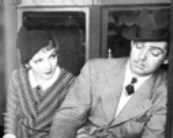 And then there is the “big act” that Ellie and Peter put on for the benefit of the private detectives while at the auto camp. Ellie and Peter play the parts of an old married couple complete with bickering, manipulation, the insinuation of alcoholic delinquency and verbal abuse in order to throw the detectives off the scent. Everyone just accepts the premise that this is how a “normal” married couple behaves and leaves them alone. What a perfect disguise!
And then there is the “big act” that Ellie and Peter put on for the benefit of the private detectives while at the auto camp. Ellie and Peter play the parts of an old married couple complete with bickering, manipulation, the insinuation of alcoholic delinquency and verbal abuse in order to throw the detectives off the scent. Everyone just accepts the premise that this is how a “normal” married couple behaves and leaves them alone. What a perfect disguise!
In Peter’s conversation with Ellie’s father at the conclusion of the film, the doting papa is evidently persuaded that a man who only wants $39.60 for expenses instead of a blackmailer’s ransom is the very man to whom he can entrust the hand of his daughter in marriage. Never mind Peter’s exclamation that “what (Ellie) needs is a guy that'd take a sock at her once a day, whether it's coming to her or not. If you had half the brains you're supposed to have, you'd have done it yourself, long ago!”
Oh dear!
Given the dismal depiction that married life receives during the course of the film, one wonders why anyone would be crazy enough to want to enter into the state of conjugal bliss in the first place.
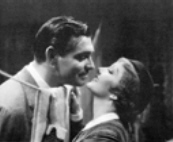 But it is Hollywood after all. And everyone was in the mood for a bit of fun and a big dose of low cost entertainment. People had enough to deal with in real life during the Depression. In those days, my family were just some of the many ordinary folk. I know that they certainly had more than enough to cope with "in just getting by" in the good old bad old days. For just a brief, magical moment with the silver screen flickering in the dim light, it's nice to think that the honeymoon will never end.
But it is Hollywood after all. And everyone was in the mood for a bit of fun and a big dose of low cost entertainment. People had enough to deal with in real life during the Depression. In those days, my family were just some of the many ordinary folk. I know that they certainly had more than enough to cope with "in just getting by" in the good old bad old days. For just a brief, magical moment with the silver screen flickering in the dim light, it's nice to think that the honeymoon will never end.
Related Reading:
- Bible quiz time: Did the original story of the walls of Jericho occur in the book of Exodus (apologies to Paul Newman), Deuteronomy, or Joshua (not the guy with the bad hair in Cecil B. De Mille production)
- The junk in the trunk: How the stuff you forgot to unpack after the honeymoon was over can skuttle even the best of relationships
- “Yes, but will she still respect you in the morning?” Respect in communication as a missing ingredient.
- Director/producer Frank Capra was the originator of the “one man, one film” concept. Whose name gets top billing on your life’s story?



